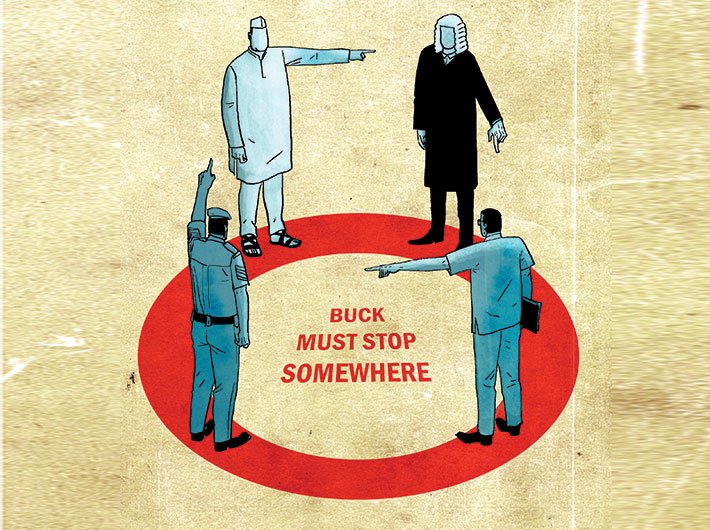It’s easy to blame lapses on ‘system failure’. What is needed is to fix responsibility and hold supervisory officers responsible
We are now faced with a situation in which senior officials across government are not doing their duty. That role has shifted to the next higher level, the comptroller and auditor general (CAG) and the judiciary, and that is the real ‘system failure’.
The state government of Uttar Pradesh has rightly transferred and will charge-sheet the district magistrate of Deoria for the wrongdoings in a shelter home. Clearly, the chief minister did not buy the argument of ‘system failure’, implying that the buck does stop with the DM.
The government of India has belatedly dismissed the chairman of the PNB, on the day of retirement, for failure to exercise control over the functioning of the bank, which enabled the fraud through misuse of SWIFT at its Brady House branch in Mumbai. A clean-up exercise is not just plugging gaps in the system.
The supreme court has sought to define ‘bona fide’ acts of the armed forces in disturbed areas distinguishing a conflict situation from rape and cold-blooded murder after detention and during searches where there is no imminent threat to the life of the soldier, and the later cover-up by the ‘system’.
The growing incidence of mob violence in the presence of the police has resulted in the advocate general admitting before the supreme court that it was difficult to stop these incidents unless responsibility for violence and vandalism was fixed on some officer.
This sets a precedent because the usual response is to deal with the symptoms, the public anger and media attention, to defuse the situation by taking some action rather than deal with the root causes – lapses on the part of supervisory officers.
For example, the first riot in Ayodhya took place under colonial administration and the district magistrate was not just transferred but got no further promotion, because transfer is no punishment. Lal Bahadur Shastri resigned as railways minister taking responsibility for a major train accident. ‘System failure’, or focus on process rather than outcomes, comes in many forms and a few are listed below to show how pervasive it is across government. It affects all sectors and levels, as well as officials and politicians.
The activities in the shelter home in Deoria have been widely reported and provide an interesting case study where orders from a higher level were systematically ignored by the lower level.
On July 28, the women and child welfare department of Uttar Pradesh ordered the district magistrate to shift residents of the shelter home as it had been running illegally. On July 31, when a team led by the district probation officer went there, they could not enter the home. An FIR was lodged but no further action was taken until a 10-year-old managed to escape from it. The women and child welfare minister rightly charged the district magistrate with dereliction of duty, as he had been there for the past one year and a number of letters, including by the principal secretary, were sent yet the centre continued to operate.
At the level of the district, despite the DM writing to the superintendent of police not to send girls there, the practice continued. The SP in turn issued directives to the police stations which were ignored. The manager of the home has claimed that after the NGO was blacklisted, 450 girls were sent to the home. The district child welfare committee reportedly sent eight letters to the DM and SP. In this case the CBI was also called to investigate allegations of misappropriation of funds worth crores meant for a crèche run by the same managers to cater to women labourers. Even more shocking is the report in The Hindu, with a senior police officer claiming that after losing recognition “the shelter home did not become illegal; it only meant that its validity had been suspended”. An inquiry into lapses by the police has been ordered at the ADG-level.
The ‘chalta hai’ attitude of ignoring orders extends even to the army. As reported in the press, the previous army chief, when he visited Uri to assess the attack on the Uri Brigade, in 2016, noticed immaculately manicured grass at the golf course as compared to the wild foliage elsewhere in the camp that had provided cover to the infiltrating terrorists, and ordered that golf would not be allowed at army posts in the Valley. A year later, the current army chief, waiting for bodies of fallen soldiers at Badami Bagh Corp headquarters noticed caddies at the adjacent golf course, where golfing was to begin once the chief left. The local commander’s explanation was that he thought the order was only for Uri. Golf courses in operational areas have now been converted to running tracks with open gyms. The differences in the requirements of operational field areas and peacetime stations are self-evident.
The Nirav Modi scam in PNB was also described as ‘system failure’ when supervisory officers did not do their job. Now the Indian Banks’ Association (IBA) has condemned the spate of charge-sheets and arrests of bankers by investigative agencies and called for bankers to be defended at the cost of the bank. This would make the alleged acts as having being undertaken in the public interest, further broadening the definition of ‘system failure’ to include criminal acts.
The CAG has been constrained to point out that the scope of modernisation of railways stations should be widened from redevelopment of the façade to include the construction of additional platforms and making new tracks so that trains do not get late. The efficiency of railways is measured by trains running on time. Delay is explained by ‘system failure’ because of the increased number of trains and maintenance work, but simple operational matters are ignored at the level of divisional railway mangers, who want the status of a secretary to government, with the support of the ministry.
Similarly, the judiciary has stepped in to order a probe into the working of the forensic science laboratory in Delhi. Interestingly enough, an inquiry into similar cases concerning rape, where FSL staffers have been accused of preparing false reports, was ordered in 2016. The blame will be put on the large number of cases, or ‘system failure’, and not repeated failure on the part of supervisory officers.
The chief minister of Bihar, who has vastly improved administration of the state, characterised the wrongdoings in the shelter home in Muzaffarpur due to “flaws in the system” and has asked the officers to check those flaws, adding that “only government employees will be involved in running shelter homes for having better control.” He is silent on fixing responsibility of supervisory officers with exemplary punishment for the lapses. Was one of the most efficient chief ministers ill-advised, constrained by politics or just defusing a situation?
Sanwal is a former IAS officer.
(The article appears in the September 15, 2018 issue)



